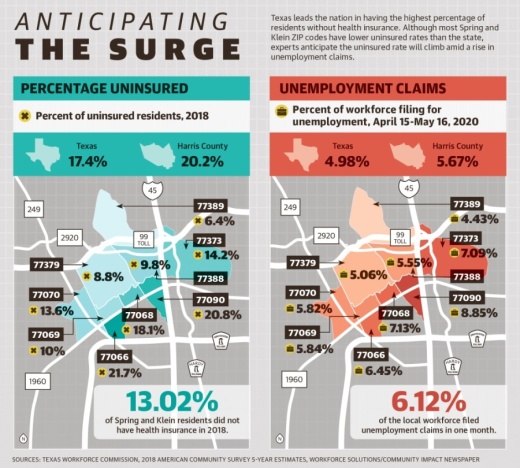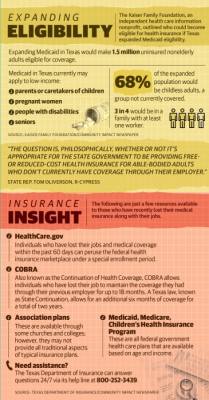“That was before the layoffs, so now the phones are ringing off the hook,” she said.
That number is expected to surge as more residents find themselves unemployed as a consequence of the host of layoffs and business closures caused by the ongoing coronavirus pandemic. Since March 11, unemployment claims peaked for the period spanning March 18-April 18, totaling 18,638 claims in the nine Spring and Klein-area ZIP codes, according to the Texas Workforce Commission.
TOMAGWA provides care to those ineligible for or unable to access health insurance throughout portions of Harris, Montgomery and Waller counties, including six ZIP codes in the Spring and Klein area, Simmons said.
More than 49,700 residents within the nine Spring- and Klein-area ZIP codes were uninsured in 2018, according to 2018 five-year estimates from the U.S. Census Bureau, which totals 13% of the population.
As Texas had the highest percentage of uninsured residents nationwide in 2018, policy leaders point to Texas’ hesitancy to expand Medicaid eligibility—as outlined by the Affordable Care Act—as a likely contributor.
“I do think the current situation really changes the playing field [for Medicaid expansion],” said John Hawkins, senior vice president for advocacy and public policy with the Texas Hospital Association. “This [legislative] session [in 2021] would be a really good chance to tee that issue up again.”
Counting the uninsured
Census estimates show Texas had the highest percentage of uninsured residents in the U.S. in 2018 with 17.4% of Texans, or 4.76 million residents, uninsured. By comparison, the U.S. rate was 9.4% in 2018.
“One of the challenges ... in Texas is we’ve got a lot of small businesses, a lot of independent contractors,” Hawkins said. “These businesses struggle to provide health insurance.”
Texas also has the second-highest noncitizen population behind California, with nearly 1.46 million uninsured noncitizens in Texas, according to 2018 census estimates.
Simmons said many of her patients are among the retail and food service workers as well as small businesses for which paying for or providing health insurance is difficult, particularly as the pandemic lingers.
“Most of our patients are in those industries who had to do the layoffs, and so they are finding themselves without insurance—or even before [the pandemic] they could not afford it, so they relied on safety-net clinics like TOMAGWA,” Simmons said.
Brian Carr, chief advancement officer of Northwest Assistance Ministries, said while NAM’s pediatric health center has experienced a decrease in patients due to fear of exposure to COVID-19 in recent months, the patients it is seeing are overwhelmingly uninsured.
“What we have seen with the patients that are showing up is a lot more patients that don’t have any type of insurance, maybe because ... one of them lost a job or has been laid off or furloughed due to the coronavirus,” Carr said.
TWC data estimates 2.16 million unemployment claims were filed in Texas between the weeks ending March 14 and May 16 as of press time.
Locally, just over 6% of the labor force in Spring and Klein filed for unemployment in the month spanning April 15-May 16, although unemployment claims peaked at more than 9% the month spanning March 18-April 18, according to census and TWC estimates.
“If we’re seeing 300,000 people at least in Houston having lost their jobs, we may have seen 300,000 people in Houston having lost their health insurance,” said Patrick Jankowski, senior vice president of Research for the Greater Houston Partnership, in a May 12 webinar.
Care during COVID-19 outbreak
To prepare for an influx of uninsured residents, Simmons said TOMAGWA moved its enrollment process online in late May. Previously, clients had to have lengthy visits with TOMAGWA to become a patient, she said.
Likewise, Avenue 360 Health & Wellness, a federally qualified health center with seven locations in the Greater Houston area, including one in Spring, has streamlined its patient registration process.
“We’ve made it a lot easier for patients to get registered and be able to be seen by a provider ... by working on our website and our patient portal,” said Dr. Therese Obioha, regional medical director for the Spring location. “A lot of it can be done electronically [now], and patients seem to find a lot of relative ease with it.”
While NAM and Avenue 360 have been able to provide some coronavirus testing throughout the pandemic, Simmons said TOMAGWA has not been able to access COVID-19 testing kits, perhaps the largest need in caring for the uninsured community.
“That’s the big issue,” she said. “As a safety-net clinic we are not on any list to receive COVID-19 tests, so we have to get out there and fight just as an individual practice to get access to the tests.”
Some testing sites have been set up around Harris County, with Harris County Public Health’s mobile sites visiting the Barbara Bush Library in Spring on April 30-May 2. However, Simmons said not having transportation is the No. 1 barrier for the uninsured population to receive care.
“Without them having the resources—the money to pay for tests—without them having their safety-net clinic being able to provide the test, you have this large population of people who are not tested who can be spreading the virus and making it worse,” Simmons said.
Expanding Medicaid
According to a report from the Kaiser Family Foundation—an independent health care information nonprofit—1.5 million uninsured nonelderly adults in Texas could be covered if the state expanded Medicaid eligibility. Policy leaders anticipate this could be more amid recent job losses.
“If we were to do Medicaid expansion right now, we would not only pick up a million and half of those adults who are already uninsured, but potentially, the million or more who may have found themselves ... uninsured ... in the last month or so,” said Anne Dunkelberg, associate director of the Center for Public Policy Priorities, an Austin-based independent public policy organization.
Most residents living in states that have expanded Medicaid and earn less than 138% of the federal poverty level are covered, according to the foundation. In Texas, low-income individuals who are pregnant, a parent or relative caretaker of a child under age 19, have a disability or a family member in the household with a disability, or are age 65 or older may be eligible for Medicaid, according to Texas Health and Human Services.
Hawkins said while many states have expanded Medicaid with no strings attached, more politically conservative states have opted to expand with a working requirement or a small out-of-pocket payment using a Section 1115 Medicaid waiver.
“It’s almost going to be super subsidized, but even if its a $5 a month premium ... at least now folks have some skin in the game,” he said.
State Rep. Tom Oliverson, R-Cypress, an anesthesiologist, said while he anticipates Medicaid expansion will be discussed in the state’s upcoming legislative session—slated to resume Jan. 12—he anticipates redistricting, unemployment and fiscal matters will get more of the focus.
“I actually think that the biggest problem we have with health care in Texas is not the availability of health care; it’s the affordability of health care,” he said. “That’s not necessarily a problem that Medicaid is designed to solve, because if ... you expand Medicaid all you’ve done is basically changed who’s paying the bill.”
Oliverson said concerns with the traditional expansion of Medicaid include that not all Texas physicians accept Medicaid and that expansion could be costly for the state.
“While I do think that there’s going to be a strong conversation about health care, ... traditional Medicaid expansion ... requires a match, and we’re not going to have any money for a match,” he said.
However, Dunkelberg said she believes the ongoing pandemic changes the Medicaid discussion.
“This disaster may help ... because you have literally millions of Texans who maybe have never been jobless before ... suddenly discover that because they have no income, they don’t qualify for anything, [so] you may have a change in the political pressure,” she said.






